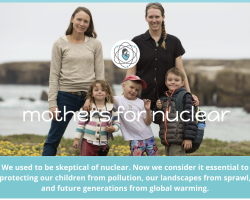Category of Content
Siting Experience Documents Only
Publication Date
Subject Matter
Keywords
Consequences of Fuel Failure on Criticality Safety of Used Nuclear Fuel
Consequences of Fuel Failure on Criticality Safety of Used Nuclear Fuel
Neutron Absorber Material Corrosion Testing Preliminary Report
Neutron Absorber Material Corrosion Testing Preliminary Report
Generic Repository Design Concepts and Thermal Analysis (FY11)
Generic Repository Design Concepts and Thermal Analysis (FY11)
Preliminary Content Evaluation of the North Anna High Burn-Up Sister Fuel Rod Segments for Transportation in the 10-160B and NAC-LWT
Preliminary Content Evaluation of the North Anna High Burn-Up Sister Fuel Rod Segments for Transportation in the 10-160B and NAC-LWT
Deep Borehole Field Test Specifications
Deep Borehole Field Test Specifications
Neutron Absorber Material Corrosion Testing Final Report FY2021
Neutron Absorber Material Corrosion Testing Final Report FY2021
Evaluation of Neutron Absorbers in the DOE Standardized SNF Canister
Evaluation of Neutron Absorbers in the DOE Standardized SNF Canister
Preliminary Evaluation of Removing Used Nuclear Fuel from Shutdown Sites
Preliminary Evaluation of Removing Used Nuclear Fuel from Shutdown Sites
Preliminary Evaluation of Removing Used Nuclear Fuel from Shutdown Sites
Preliminary Evaluation of Removing Used Nuclear Fuel from Shutdown Sites
Preliminary Evaluation of Removing Used Nuclear Fuel from Shutdown Sites
Preliminary Evaluation of Removing Used Nuclear Fuel from Shutdown Sites
Initial Standardized Canister System Evaluation
Initial Standardized Canister System Evaluation
A Salt Repository Concept for CSNF in 21-PWR Size Canisters
A Salt Repository Concept for CSNF in 21-PWR Size Canisters
Preliminary Evaluation of Removing Used Nuclear Fuel from Shutdown Sites
Preliminary Evaluation of Removing Used Nuclear Fuel from Shutdown Sites
M3SF-19OR0204050160- Criticality Process, Modeling and Status for UNF-STDARDS
M3SF-19OR0204050160- Criticality Process, Modeling and Status for UNF-STDARDS
Preliminary Evaluation of Removing Used Nuclear Fuel from Shutdown Sites
Preliminary Evaluation of Removing Used Nuclear Fuel from Shutdown Sites
A Salt Repository Concept for CSNF in 21-PWR Size Canisters, Rev 2
A Salt Repository Concept for CSNF in 21-PWR Size Canisters, Rev 2
Mothers for Nuclear Flyer
Mothers for Nuclear Flyer
Mothers for Nuclear Informational Flyer
Guidance for Creating a Community Benefits Plan for Regional Direct Air Capture Hubs
Guidance for Creating a Community Benefits Plan for Regional Direct Air Capture Hubs
This document is intended to provide supplemental information to assist applicants developing a Community Benefits Plan (CBP) for the Regional Direct Air Capture Hubs. As shown in the graphic to the right, Community Benefits Plans are based on a set of four core interdependent policy priorities: engaging communities and labor; investing in America's workforce; advancing diversity, equity, inclusion, and accessibility; and implementing Justice40.
The Social and Ethical Aspects of Nuclear Waste
The Social and Ethical Aspects of Nuclear Waste
Nuclear waste management seems to exist in a perpetual state of crises. For 50 years the nuclear states of the world have fought, and generally lost, the battle to deal with the nuclear waste problem. Worldwide, there is a growing acknowledgement within industry and government that social and ethical issues are just as important as technical issues when developing safe programs for nuclear waste management. This paper is a review of some of the outstanding social and ethical issues that are influencing discussions on nuclear waste management around the world.
Policies for Achieving Energy Justice in Society: Best Practices for Applying Solar Energy Technologies to Low-Income Housing
Policies for Achieving Energy Justice in Society: Best Practices for Applying Solar Energy Technologies to Low-Income Housing
Studies indicate that the energy burden — energy costs as a percentage of annual family income — on low-income families is inordinately high, compared to that of the rest of the population. Rising fuel costs exacerbate this problem. Residential solar energy systems can help address this situation by furnishing a price-stable energy source with the added benefit of reduced greenhouse gas emissions. However, without appropriate incentives, these systems are prohibitively expensive for low-income families.

